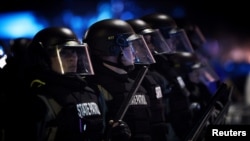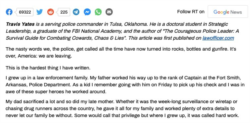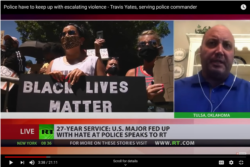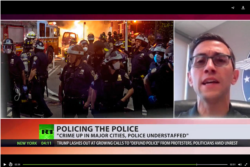Russia appears to be intensifying its focus on police enforcement issues in the United States, using popular reactions to protests that have gripped the nation as part of a larger propaganda campaign to divide Americans ahead of the U.S. presidential election in November.
The death of African American George Floyd in police custody and the ensuing U.S. protests have for weeks dominated media coverage from Russian state-sponsored outlets like RT and Sputnik.
Only now, it seems that Russia, through the English-language RT in particular, is reaching out to U.S. police officers and union officials, in what some U.S. officials and lawmakers say is an effort to further inflame tensions.
“It is critical that Americans remain wary of state-sponsored and state-directed media platforms such as RT and Sputnik,” Senate Intelligence Committee Acting Chairman Republican Marco Rubio told VOA.
“Russia wants nothing more than to exploit our own divisions in an effort to exacerbate existing societal tensions,” Rubio added, confirming lawmakers are worried about Russian efforts to use or influence police officers and their supporters.
Law enforcement officers and organizations who spoke with VOA about their interactions with RT described being caught off guard.
“We had no idea about the ties they have,” a representative for lawofficer.com, a website catering to law enforcement officers, told VOA about being approached by the Russian television news channel. “They actually told us they were out of Britain.”
RT contacted lawofficer.com seeking permission to republish an essay by Tulsa, Oklahoma Police Major Travis Yates about the frustration he and many of his police colleagues have been feeling as a result of the protests of police practices, titled, “America, We Are Leaving.”
RT also booked Yates for an on-air interview through its London bureau.
“If I had any idea whatsoever, I obviously never would have done it,” Yates told VOA when asked if he knew about RT’s Russian connection.
Since Yates’ essay was first published, it has been shared thousands of times on social media and even helped get him an appearance on Fox News’ "Tucker Carlson Tonight."
RT amplifying police anger
Only Yates, no stranger to media engagement or controversy, said when it came to RT, he soon realized something was amiss.
“I knew when I saw the article and I saw how they misrepresented the first sentence,” he said.
The original version starts with the words, “This is the hardest thing I have written.”
RT’s version, according to Yates and lawofficer.com, was edited without authorization to begin with anger and frustration.
“The nasty words we, the police, get called all the time have now turned into rocks, bottles and gunfire. It’s over, America: we are leaving.”
Yates said it was not until after he gave an on-air interview to RT, the focus of which he said was misrepresented, did he learn that RT was a Russian-backed operation.
And it still bothers him.
Yates said what he finds most disheartening is to see fellow U.S. law enforcement officers continue to share the RT version of his essay, unaware of what he described as added spin or the links to the Russian government.
“When you go to their website, it looks like a lot of other sites,” he said. “There needs to be a heightened sense of awareness."
Days earlier, RT also reached out to and quoted Officer Joe Gamaldi, the president of the Houston Police Officers’ Union, for an article about calls in the U.S. to defund police departments.
“Defunding the police is an extremely dangerous idea,” Gamaldi was quoted as saying. “I think it makes for a popular hashtag on Twitter, and you have a lot of Hollywood elites who are jumping in on this.”
Gamaldi confirmed the quotes are accurate but said he was unaware that U.S. officials view RT as a “state-sponsored disinformation organ.”
“I won’t do any further interviews with them,” he wrote in an email.
When contacted by VOA about its interactions with lawofficer.com and with Gamaldi, RT said its staff members were forthright about who they were, identifying themselves as a writer “on behalf of RT International” and as a “British-based editor with RT.com.”
In a statement, RT also argued that despite what Yates and lawofficer.com said, changes to the op-ed were coordinated and approved in advance.
U.S. officials note there are no laws that prohibit police from giving interviews to outlets like RT and that such interactions are protected by the Constitutional right to free speech.
But some experts worry that the lack of understanding by many in law enforcement, as well as in the general public, about its state-backed media is making it easier for Russia to deepen existing societal divides.
“The weakness in police is the weakness with our entire non-response to disinformation, we leave it up to the individual to defend themselves,” said Molly McKew, a senior adviser on countering disinformation to the Stand Up Republic Foundation, a non-profit organization which advocates for government reform.
“There are about 18,000 sheriffs and police departments and county police and other police agencies across the country. Do you think every single one of those is prepared to respond to rumors that they find on the Internet, or to turn down the state media requests from a hostile foreign nation? No. Of course not,” she said. “And those guys will just keep calling around until they get the quote they need.”
Russian disinformation campaigns
This is not the first time Russian-linked entities have tried to use U.S. law enforcement in their efforts to divide the country.
In the months leading up to the 2016 presidential election, a report by Oxford University's Computational Propaganda Project and the network analysis firm Graphika found Russia’s Internet Research Agency (IRA) heavily targeted the African American community, using issues like “police violence, poverty and disproportionate levels of incarceration,” to convince voters to stay home.
At the same time, the IRA’s most viewed ad before the 2016 election was for a Facebook page called “Back the Badge,” which described itself as a “Community of people who support our brave Police Officers.”
According to data compiled by Facebook and released in 2018 by the House Intelligence Committee, the “Back the Badge” ad was seen more than 1.3 million times, getting more than 73,000 clicks.
That type of success is what the Kremlin may be looking to replicate with Russian media’s outreach to U.S. police officers, who are now under greater scrutiny amid calls for reform.
"They’re such easy prey for state-level propaganda,” a local law enforcement officer with prior intelligence experience told VOA, speaking on condition of anonymity.
Identifying disinformation efforts
The officer said few U.S. police departments, if any, are offering the type of training that could help their members avoid a trap that starts with a sympathetic pitch and ends with leading questions designed to play up tensions.
As a result, the strategy is “risk-free for RT and countless FB (Facebook) accounts,” the officer said.
And some analysts warn every interview an outlet like RT gets, the more Russia wins.
“When officials give comment to RT, it legitimizes it as a ‘serious’ news outlet,” according to Nina Jankowicz, a Disinformation Fellow at the Washington-based Woodrow Wilson International Center for Scholars. “This is absolutely part of RT's strategy, and why it rebranded from its original name of ‘Russia Today.’”
For now, it is unclear what measures, if any, are being taken to educate U.S. police officers about outreach from state-backed outlets like RT and Sputnik, or to inoculate them from more devious influence operations.
Major police departments contacted by VOA, including New York, Washington and Houston, were unaware of any specific training for officers about propaganda or disinformation efforts by U.S. adversaries.
The Fraternal Order of Police, which bills itself as “the world's largest organization of sworn law enforcement officers,” did not respond to multiple emails or calls about what services or training it is offering to members.
And there seems to be little information or consensus about what federal agencies should be doing, if anything.
The FBI provides resources for protecting against influence operations and cybersecurity threats through its Protected Voices initiative and runs the country’s Foreign Influence Task Force (FITF) but had no comment on any efforts to work with local police departments to counter the threat.
The Justice Department, which required RT and Sputnik to register as foreign agents, did not respond to multiple VOA requests for comment.
The State Department also monitors and works to counter propaganda and influence campaigns through its Global Engagement Center (GEC). But a spokesperson said the center’s efforts “are aimed at foreign audiences.”
U.S intelligence agencies, likewise, are monitoring Russian propaganda and influence operations. Only former intelligence officials caution, in this situation, the role of the intelligence community is limited.
“There is not much that the IC (intelligence community) can do except report on it,” said John Sipher, a 28-year veteran of the CIA who once ran the agency's Russia operations.
“It takes policy and political agreement to stop these kinds of information warfare campaigns,” he added. “The U.S. and its allies have to call it out and create pain for the Kremlin – everything from sanctions and restricting the movement of Russian money, to disinviting Russian officials to official fora.”
Sipher, who has been critical of U.S. President Donald Trump, does not see that happening.
“As long as the president sees Russian attacks as a domestic political issue rather than a national security issue, it will be hard for the U.S. to do what it takes to defend, deter and defeat these attacks,” he said.
Urging Americans to be on alert
For now, U.S. officials and lawmakers continue to urge Americans to be on alert and to be aware of where they get their information.
Yet there also seems to be a sense of frustration in some circles about what RT and Sputnik have been able to achieve in the open.
“We cannot do much about that—other than urge certain people to resist the temptation to do things that further divide the country,” a U.S. official with knowledge of ongoing efforts to counter Russian influence operations told VOA on condition of anonymity.
That is not the case, though, with what the official described as “more covert messaging” by foreign adversaries.
“Where we find it happening, as has happened in the past, we work with the companies to take down inauthentic accounts or accounts where the messaging otherwise violates the policies of the companies,” the official said.
In the most severe cases, “there are a range of options that get considered,” the official said, including the use of U.S. Cybercommand for “more direct action.”








